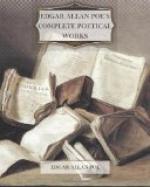length, a size surpassing that of any previously
recorded visitation. The people now, dismissing
any lingering hope that the astronomers were wrong,
experienced all the certainty of evil. The
chimerical aspect of their terror was gone. The
hearts of the stoutest of our race beat violently
within their bosoms. A very few days suffered,
however, to merge even such feelings in sentiments
more unendurable. We could no longer apply to
the strange orb any accustomed thoughts.
Its historical attributes had disappeared.
It oppressed us with a hideous novelty of emotion.
We saw it not as an astronomical phenomenon in the
heavens, but as an incubus upon our hearts and a
shadow upon our brains. It had taken, with
unconceivable rapidity, the character of a gigantic
mantle of rare flame, extending from horizon to
horizon.
Yet a day, and men breathed with greater freedom. It was clear that we were already within the influence of the comet; yet we lived. We even felt an unusual elasticity of frame and vivacity of mind. The exceeding tenuity of the object of our dread was apparent; for all heavenly objects were plainly visible through it. Meantime, our vegetation had perceptibly altered; and we gained faith, from this predicted circumstance, in the foresight of the wise. A wild luxuriance of foliage, utterly unknown before, burst out upon every vegetable thing.
Yet another day—and the evil was not altogether upon us. It was now evident that its nucleus would first reach us. A wild change had come over all men; and the first sense of pain was the wild signal for general lamentation and horror. The first sense of pain lay in a rigorous construction of the breast and lungs, and an insufferable dryness of the skin. It could not be denied that our atmosphere was radically affected; the conformation of this atmosphere and the possible modifications to which it might be subjected, were now the topics of discussion. The result of investigation sent an electric thrill of the intensest terror through the universal heart of man.
It had been long known that the air which encircled us was a compound of oxygen and nitrogen gases, in the proportion of twenty-one measures of oxygen and seventy-nine of nitrogen in every one hundred of the atmosphere. Oxygen, which was the principle of combustion, and the vehicle of heat, was absolutely necessary to the support of animal life, and was the most powerful and energetic agent in nature. Nitrogen, on the contrary, was incapable of supporting either animal life or flame. An unnatural excess of oxygen would result, it had been ascertained, in just such an elevation of the animal spirits as we had latterly experienced. It was the pursuit, the extension of the idea, which had engendered awe. What would be the result of a total extraction of the nitrogen? A combustion irresistible, all-devouring, omni-prevalent, immediate;—the




